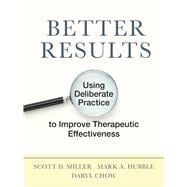This book is a step-by-step guide to using deliberate practice as an individualized professional development plan for psychotherapists to improve the quality of their service using client outcome data.
Deliberate practice is a systematic approach for improving psychotherapy outcomes, one clinician at a time. This step-by-step guide to deliberate practice demonstrates how to collect and use client outcome data to create an individualized professional development plan to improve the quality of your service.
Your goal is to help more of your psychotherapy clients get better. For those who do realize gains, your goal is to help them experience a greater degree of improvement as a result of working with you. In this book you will learn how to conduct routine outcome measurements to gather data from your own practice. Detailed instructions and examples walk you through the process of determining your baseline performance, identifying and addressing your strengths and deficits as a practitioner, and assessing your progress.
Richly-drawn case studies and stories from the business world and popular culture illustrate how research from the field of expert performance offers a different paradigm for professional development that departs from the field’s traditional emphasis on learning therapy models and techniques.








